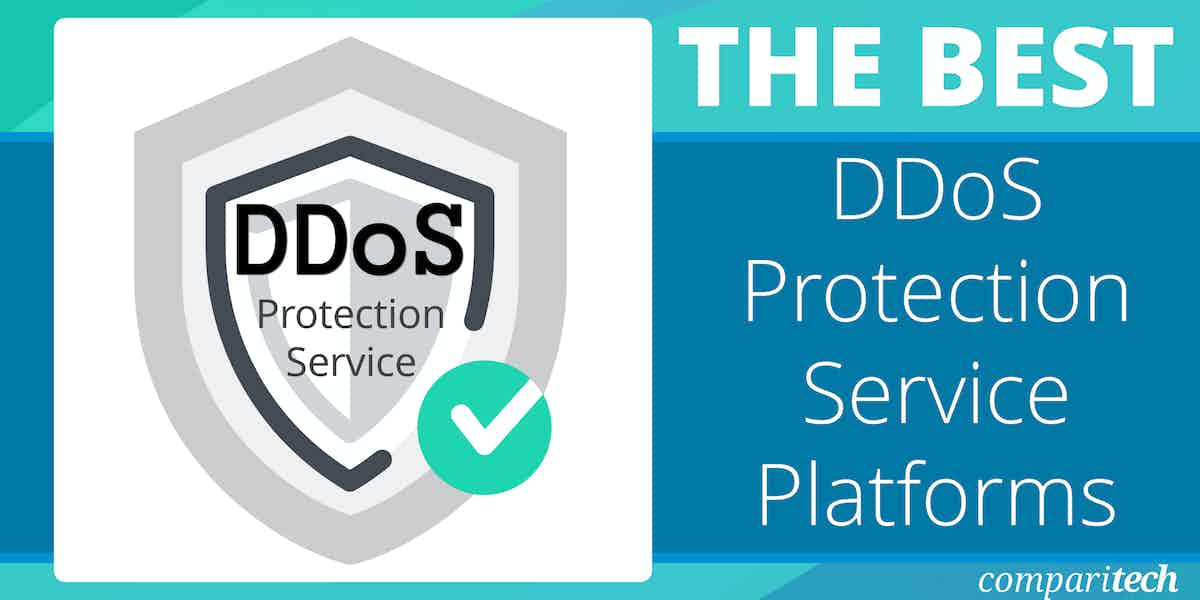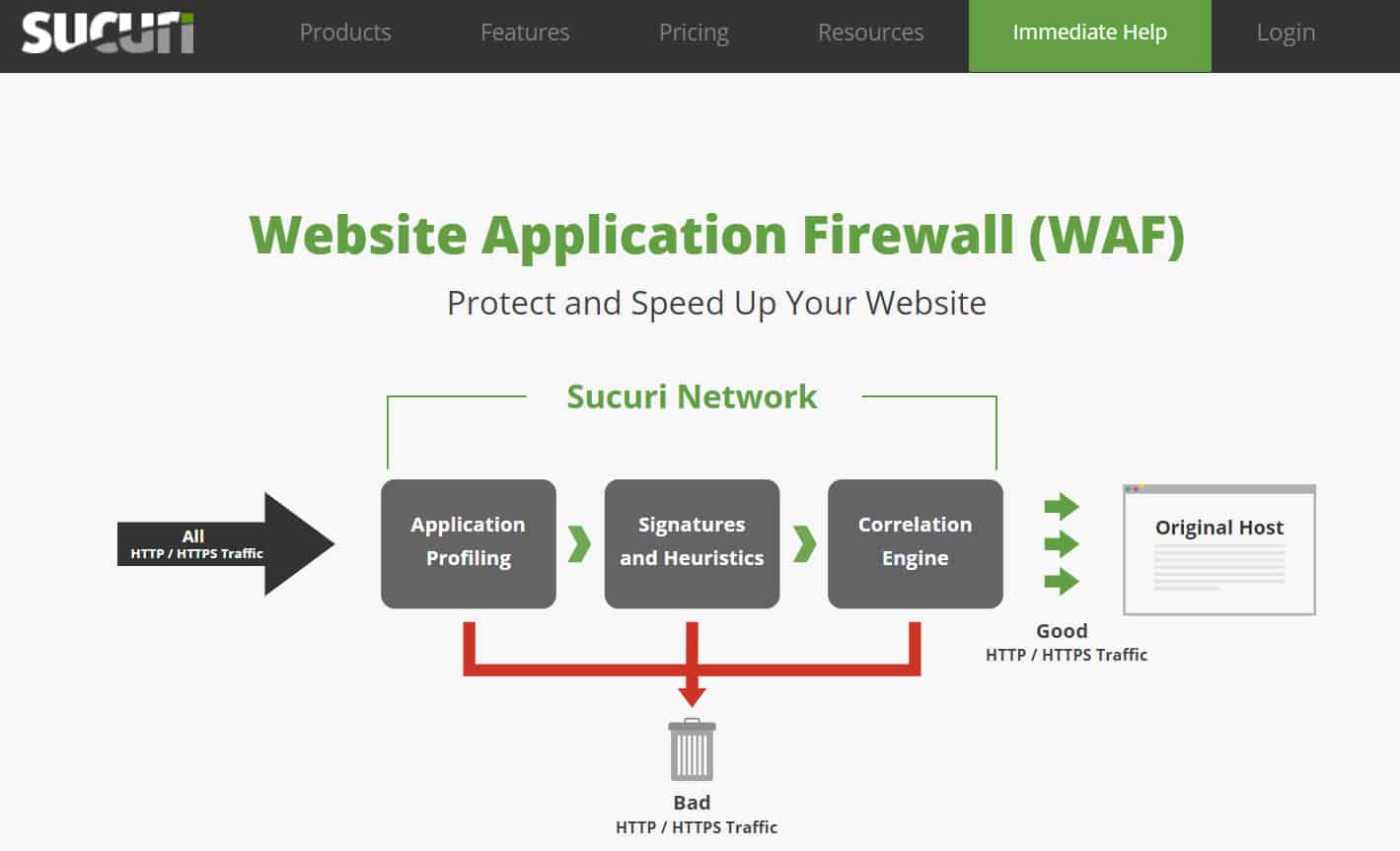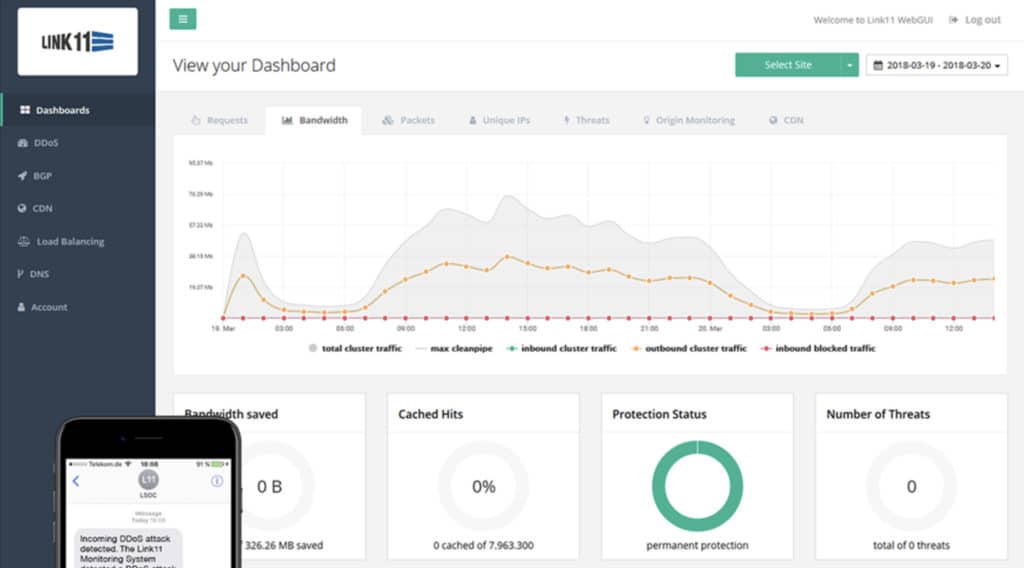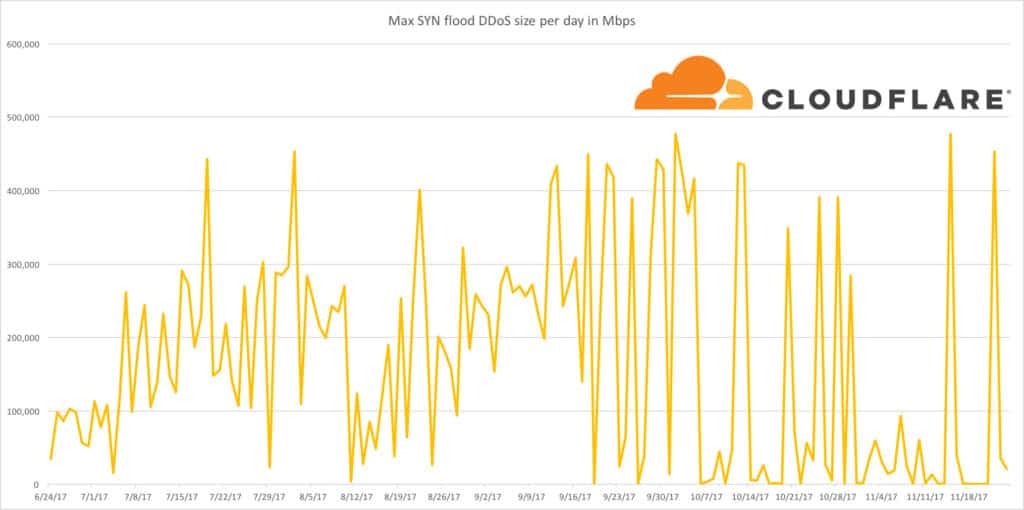DDoS or Distributed Denial of Service is one of the biggest threats modern enterprises face online. The frequency of DDoS attacks has increased 2.5 times over the last 3 years making them more prevalent than ever before. In this article, we’re going to look at the best DDoS protection services.
Here is our list of the best DDoS protection tools and managed services:
- Sucuri Website Firewall EDITOR’S CHOICE This WAF inspects all incoming HTTP/HTTPS traffic, blocks suspicious traffic. Utilizes advanced Geo-blocking capabilities.
- SolarWinds Security Event Manager A comprehensive tool that can detect and monitor a host of network events including DDoS attacks. Maintains attacker IPs logs and even blocks IPs.
- Indusface AppTrana A Web application firewall that includes vulnerability scanning, DDoS protection, and bot control detection. This edge services bundle also includes a content delivery network.
- Link11 Cloud-based protection service can detect and mitigate attacks. Easy to deploy, uses AI and dashboard gives good view of server behavior.
- CloudFlare Network capacity can handle some of the largest known attacks. Uses an IP reputation database to manage a wide range of attack types.
- AWS Shield Analyzes incoming traffic using flow monitoring, packet filtering, and prioritizing traffic in real-time.
- Akamai Prolexic Routed Block DDoS attacks such as UDP floods, SYN floods, HTTP GET, and POST floods.
What is a DDoS attack?
During a DDoS attack, an attacker uses a network of compromised computers called a botnet to send traffic to your network. The traffic overwhelms consumers network resources and makes services unavailable.
For example, you may have trouble accessing the internet or using an application. Common DDoS attacks include ICMP flood, SYN flood, Ping of Death, Slowloris, and more. Each of these service attacks targets different vulnerabilities and must be defended against in different ways.
Related post: How to Stop a DDoS Attack
The best DDoS Protection Tools & Anti-DDoS Software
DDoS prevention software is designed to block malicious traffic from reaching your network. Each solution is different in its approach due to the variety of DDoS attacks you can encounter on a daily basis.
Our methodology for selecting a DDoS protection service platform
We reviewed the DDoS protection service market and analyzed tools based on the following criteria:
- Capabilities to root out a range of attack strategies
- Constant availability of a cloud-based dashboard
- The option to integrate DDoS protection with other edge services, such as load balancing
- Attack strategy analysis support
- Alerts for ongoing attack notification
- Reporting for billing through to clients for service providers
- Options for a free assessment period
- Prices levels that offer a good price for useful tools and the options of further savings by combining services
Let’s have a look at some of the best DDoS Protection tools as well as Anti-DDoS software available.
1. Sucuri Website Firewall (LEARN MORE)
Sucuri Website Firewall is a website application firewall that can prevent DDoS attacks and zero-day exploits. Sucuri Website Firewall inspects all incoming HTTP/HTTPS traffic and blocks suspicious traffic from reaching your service. This stops botnets from being able to put your site offline.
Key Features
- Malware removal: Identifies and removes malware from your Web server
- Cleans up after hackers: Spots changes and repairs the damage
- DDoS mitigation: This is a proxy server that receives your traffic and only passes through real traffic
Why do we recommend it?
Sucuri Website Firewall is a major competitor to our top pick, Indusface AppTrana. This is a cloud-based edge service that doesn’t need to be hosted or maintained but instead, diverts all traffic on the way to a Web asset and filters out attacks. The protected system only receives the valid traffic and the value of the Sucuri service is its ability to tell the difference between malicious and genuine traffic.
For additional protection Sucuri Website Firewall uses geo-blocking. Geo-blocking blocks visitors to your site from the top three countries with DDoS attacks. However, if you want to control access to a smaller degree you can white list IP addresses that you trust so that you can communicate with your team without them being blocked.
There are four versions of Sucuri Website Firewall available to purchase: Basic, Pro, Business, and Custom Solutions. The Basic version starts at $9.99 (£8.19) per month. The Pro version starts at $19.98 (£16.39) per month with SSL certificate support.
Who is it recommended for?
The potential market for Sucuri Website Firewall is the same as that for Indusface AppTrana. The two tools work in a very similar way and each acts as a proxy server, receiving all traffic on behalf of the protected website. So, you don’t need to dedicate any specialist cybersecurity staff to managing your site’s protection. An important difference between these two services is that the Sucuri system is significantly cheaper and so it is more likely to appeal to small businesses.
Pros:
- Emergency repair: Sign up for the package when you are already under attack and get all threats stopped and damage repaired
- Regular scans: Sweeps through your system every 30 minutes
- Content delivery network and offloading: Sucuri serves visitors and your own site becomes a reference
Cons:
- No self-hosting option: This is a cloud service
The Business version costs $69.93 (£57.35) per month with additional features. The Custom Solutions are customizable packages on their website where you can chat to an online assistant and learn more.
EDITOR'S CHOICE
Sucuri Website Firewall is our top pick for anti-DDoS software because of its advanced security features that effectively protect websites from distributed denial-of-service (DDoS) attacks. The firewall provides real-time monitoring and defense mechanisms that detect and mitigate large-scale DDoS attacks, safeguarding websites against performance degradation and downtime. By blocking malicious traffic before it reaches the website, Sucuri ensures that only legitimate users can access the site, preserving its availability even during a DDoS attack. This proactive approach is critical for businesses that rely on their websites for e-commerce, customer interaction, or service delivery. In addition to its DDoS protection, the Sucuri Website Firewall offers an impressive set of security features, including website application firewall (WAF), malware detection, and bot mitigation. The WAF filters out malicious requests, protecting websites from a range of attacks, including SQL injections, cross-site scripting (XSS), and other common web vulnerabilities. The firewall integrates seamlessly with other Sucuri tools to provide a multi-layered security strategy. Its cloud-based architecture ensures that the website’s server is not burdened by the traffic filtering process, improving overall site performance and reducing the risk of server overloads during an attack. Sucuri’s Website Firewall also provides detailed traffic analytics, giving administrators insight into attack patterns and allowing for rapid adjustments to security policies.
Download: Learn More
Official Site: https://sucuri.net/
OS: Windows Server
2. SolarWinds Security Event Manager
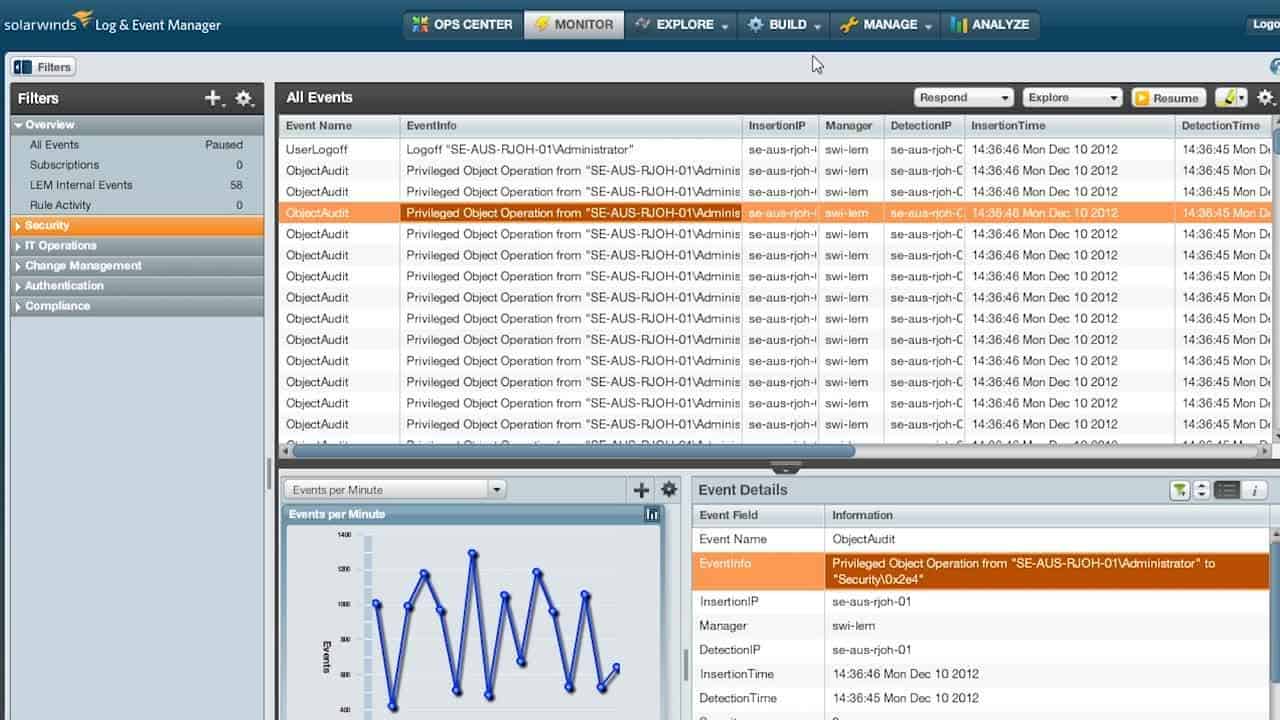
SolarWinds Security Event Manager is a DDoS protection tool with event log monitoring capabilities. Event logs are a key resource for detecting when malicious entities are trying to disrupt your network.
Key Features:
- Log manager: Getrhers, consolidated, and files log messages
- SIEM tool: Implements automated threat detection
- Manual analysis: Data viewer with analytics tools
- Traffic feed: Add in network traffic data to get DDoS detection
Why do we recommend it?
SolarWinds Security Event Manager is more of a DDoS detection system than a DDoS protection service. This is because the tool collects log messages and analyses them and one of the things that it looks for is a suspicious traffic surge. The tool is able to indicate that a DDoS attack is in progress and will raise an alert to attract the attention of technicians. The package doesn’t include any DDoS mitigation services, however.
To protect you from attackers SolarWinds Security Event Manager maintains a list of known bad actors so that the program can automatically block an IP from interacting with your network. The list is community-sourced so that you stay protected from the most recent threats.
During an attack, you can also configure alerts to notify you when a suspicious source is sending you traffic. The logs recorded by SolarWinds Security Event Manager can also be used for DDoS mitigation and retrospective analysis. You can filter through results to find accounts, IPs, or time periods to analyze in closer detail.
Who is it recommended for?
SolarWinds Security Event Manager is a high-capacity log management tool and security detection service. It is suitable for use by large organizations. The package is expensive and offers too much functionality for the needs of small businesses. Those organizations that need to prove compliance with data protection standards particularly need this tool.
Pros:
- Anomaly-based detection: Looks for unusual patterns in activity
- Zero-day protection: Can spot new attack strategies and irregular intruder activity
- Remediation playbooks: Link actions to alert conditions to get threats shut down automatically
- Compliance reporting: DISA STIG compliance
Cons:
- Only for Windows Server: Not available for macOS, Linux, or cloud platforms
SolarWinds Security Event Manager starts at a price of $4,655 (£3,819). You can also download the 30-day free trial.
3. Indusface AppTrana
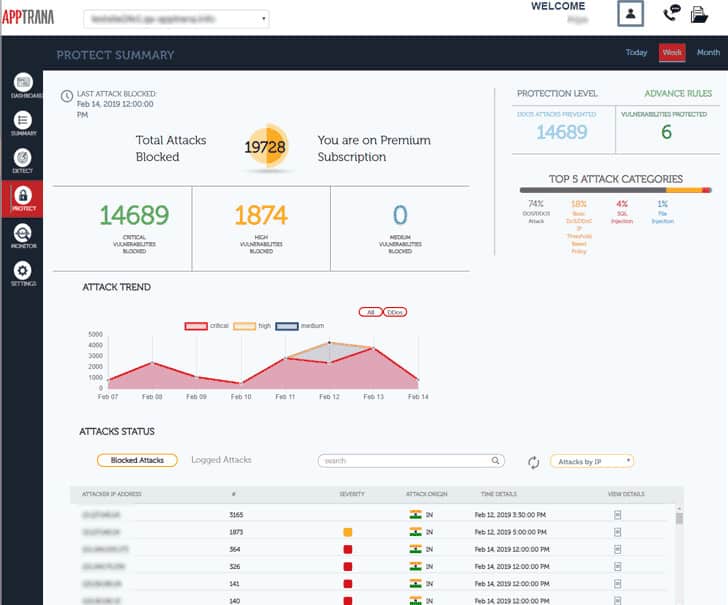
AppTrana is a fully managed WAF, DDOS, and Bot mitigation solution from Indusface. The edge service bundle includes a Web Application Firewall, vulnerability scanners, a patching service, and DDoS protection. The service can absorb extreme volumetric attacks and is able to distinguish DDoS from genuine surges in traffic.
Key Features
- Web application firewall (WAF): Also known as a Web application and API protection (WAAP) system
- DDoS behavior-based detection: Identifies attacks rather than traffic surges
- Unmetered service: Traffic floods won’t cost you more
- Application security: Scans inbound traffic for threats
- API protection: Prevents hackers exploiting your APIs
Why do we recommend it?
Indusface AppTrana is a Web Application Firewall and is delivered from the cloud, so it provides a range of Web protection services and easily plugs into your system without you having to install any software. The tool is managed by Indusface technicians and all the user needs to know is how to access the cloud-hosted console to see whether any DDoS attacks have been attempted.
AppTrana uses its database to develop rules and alert conditions for your websites. Sites are monitored 24×7 to make sure no attack spills through the net. The software can also automatically detect botnets based on their behavior and block them. This means that the botnet cannot disrupt your site. To keep the network protected from layer 3 attacks, AppTrana has been built on AWS to help resist common volumetric attacks.
The vulnerability scanning service in AppTrana references the OWASP Top 10 Threats and the SANS 25 Vulnerability list. The service immediately fixes any vulnerabilities that it discovers through patching. Vulnerability scans are conducted regularly and automatically. Other features in the AppTrana bundle include SSL offloading and a content delivery network for site acceleration.
There are two editions of AppTrana: Advance and Premium. The Advance service is the edge system described above. It costs $99 per protected app per month. The Premium version is a managed website security service. This includes the services of network security analysts to identify attacks and adapt security protection strategies. While vulnerability testing is included in this plan, those checks are supplemented by human pen testers. The Premium plan costs $399 per protected app per month.
Who is it recommended for?
Any business can use AppTrana because it is a remote service and you don’t need any involvement in running the service. That means small businesses don’t need to have any technical expertise on staff or pay for expensive consultants in order to get full protection against DDoS attacks against their Web assets. Large organizations also benefit from this configuration because their existing IT Department won’t be stretched by extra tasks once the WAF is in operation.
Pros:
- Security audits: A vulnerability scanner that is tuned to local and industry requirements
- Automated patching: Virtual patching filters out threats to known software vulnerabilities
- Traffic scrubber: Blocks chaff while letting the real traffic through
- AI-based bot detection: Looks at inbound and outbound traffic patterns to identify external controls and fake transactions
- Blacklisting: Blocks traffic from known hacker IPs and dodgy locations
Cons:
- Not available for self-hosting: This is a cloud platform
AppTrana Advance edition is available for a free trial.
4. Link11
Link11 is a cloud-based DDoS protection tool. The system can detect and mitigate web and infrastructure DDoS attacks through layers 3-7 in real-time. The software uses artificial intelligence (AI) to detect an attack.
Key Features
- A proxy service: Will protect networks and Web assets
- DDoS protection: The Link 11 platform absorbs traffic floods
- Content delivery network: Speeds up website response times
Why do we recommend it?
Link11 is a specialized DDoS protection system rather than a feature of a wider Web application firewall or edge service bundle. The system is highly regarded and quickly spots DDoS attacks. The ability to perform at speed and accurately identify malicious traffic can make or break a DDoS protection system because no one wants genuine traffic to be held up or blocked. Link11 uses AI to sharpen its DDoS blocking service.
The AI analyzes the sequences of known-attack patterns and uses this data to compare with live usage. If a connection to the network is behaving the same way as a potential attacker the platform can respond immediately with a notification via SMS once a threat is detected.
In terms of setup, Link11 is very easy to deploy because it is run in the cloud. You don’t need to set up additional hardware and in a matter of minutes, you can configure the platform to protect your network infrastructure from an attack. The monitoring dashboard provides you with a centralized view of traffic, application and server behavior protection service can detect and mitigate attacks. Easy to deploy, uses AI and dashboard gives good view of server behavior.ior so you can see what’s going on.
There is also a reporting feature so you can generate reports on security events. The program enables you to schedule reports or generate them manually depending on your needs.
Who is it recommended for?
Link11 is a good choice for a large business that is dependent on the availability of its websites to maintain profitability. There are two aspects to this package that will put small businesses off. The first is that rival systems combine DDoS protection with other services, such as a content delivery service, which provides all of the edge services that a website needs. The other detraction is that Link11 doesn’t publish a price list and you can’t just sign up through an automated online process.
Pros:
- Filters out attack: All your inbound traffic goes to Link11 servers
- Hacker protection: Your own IP address is kept secret, hackers can only go to the Link11 server
- Bot detection: Identifies malicious activity by behavior or source
Cons:
- No price list: No free trial
Link11 is one of the most widely-used DDOS protection platforms on this list because it combines simplicity with top-notch automation. The AI is excellent at navigating the latest threats. If you’d like to view the price of Link11 you will have to contact the company directly.
5. Cloudflare
Cloudflare is a high-performance DDoS protection service that has a network capacity of 30 Tbps, 15x that of the largest DDoS attack ever recorded. The high capacity makes Cloudflare resistant to even the most powerful attacks. To keep up with new forms of attack the software uses an IP reputation database which blocks new threats across 20 million different properties.
Key Features
- Free edition: Suitable for small businesses
- DDoS protection: This is Cloudflare’s core service
- SSL certificate: Includes in all plans
Why do we recommend it?
Cloudflare just about invented the modern DDoS service and that makes this a very difficult service to beat. The company has massive capacity to absorb very large traffic floods and that also makes it the first choice for many businesses. Since its inception as a DDoS protection service, Cloudflare has expanded into other edge services and can combine DDoS protection with content delivery, failover protection, and malware protection.
The defenses of Cloudflare have been designed to cover a range of DDoS and data breach attacks. For example, the product uses rate limiting to block network visitors with unusually high request rates. Likewise, it uses a Content Delivery Network or CDN to ensure the network stays available. The CDN is supported by 193 data centers across 90 countries.
There are four different versions of Cloudflare; Free, Pro, Business, and Enterprise. The Free version doesn’t cost anchoring for individuals with a personal website. The Pro version costs $20 (£16) per month with a Web Application Firewall designed for professional websites, blogs, and portfolios.
Who is it recommended for?
Cloudflare is appealing to any business that runs a website. The company has created a Free plan, which includes many other edge services. So, this is probably the natural number-one choice for startups and small businesses. The vast capacity of this system to absorb attacks will also appeal to very large organizations that are regularly subject to DDoS attacks.
Pros:
- Plans for different sizes of businesses: All types of businesses with Web assets are catered for
- PCI DSS compliance: Included in the top two plans
- Uptime guarantee: For the two highest plans
Cons:
- Reporting not so great: Analytical features could be better
The Business version costs $200 (£164) per month with the option to use custom WAF rules, 100% uptime SLA and the fastest speed. The Enterprise version is a customizable package with a named solution engineer and is priced on a case-by-case basis. You can check out their pricing plans or download the free trial version.
6. AWS Shield
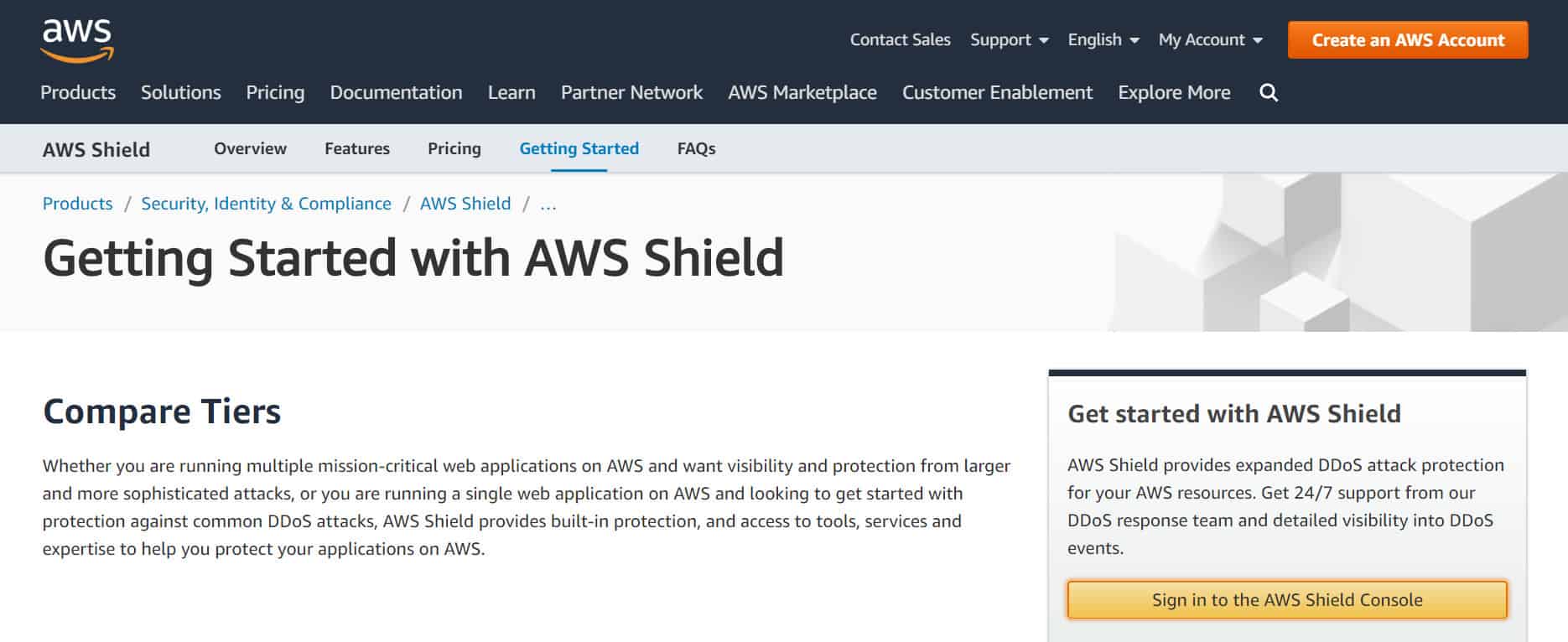
AWS Shield is a managed DDoS protection solution that uses flow monitoring to analyze incoming traffic. By monitoring flow data AWS Shield can detect malicious traffic in real-time. The solution also uses other defense measures like packet filtering and prioritizing traffic to control the management of traffic in the network.
Key Features
- The Standard edition is included with all AWS services: You don’t need to pay anything
- DDoS protection: Also provides a dashboard that shows attack histories
- DDoS consultants: Human expert advice in the higher plan
Why do we recommend it?
AWS Shield is available in a number of editions that offer increasingly more complicated services and capabilities. However, the basic package is enough for those seeking DDoS protection and that edition is free to use. The higher plans enable experienced cybersecurity experts to write their own firewall rules and there is also an option to get automated responses implemented.
You can also write rules with AWS WAF to defend against application-layer attacks. For more advanced protection there is AWS Shield Advanced. AWS Shield Advanced uses mitigation capacity to minimize the effect of larger DDoS attacks. There is also a dedicated response team on hand to assist with manual mitigations for more complex attacks.
There are two main versions of AWS Shield available on the market: AWS Shield Standard and AWS Shield Advanced. AWS Shield Standard is free and provides protection against common network and transport DDoS attacks.
Who is it recommended for?
AWS Shield is certainly designed as a strong rival to Cloudflare. Its free tier is a great marketing advantage when pitching for small business customers. However, there is one attribute of the AWS Shield that limits its appeal. That is, this system is only designed to protect AWS accounts, such as the EC2 system. The paid plans are quite expensive and they are suitable for large enterprises.
Pros:
- Widely available: All AWS customers get this service
- Self-service WAF: Included in both plan levels
- Application protection: Blocks attempts to install malware
Cons:
- Service Level Agreement only in the paid plan: No SLA in the free service
AWS Shield Advanced includes additional defense features for Amazon Elastic Compute, Amazon CloudFront, AWS Global Accelerator, and Elastic Load Balancing. AWS Shield Advanced costs $3,000 (£2,460) per month plus additional usage fees. You can get started with AWS Shield here.
7. Akamai Prolexic Routed
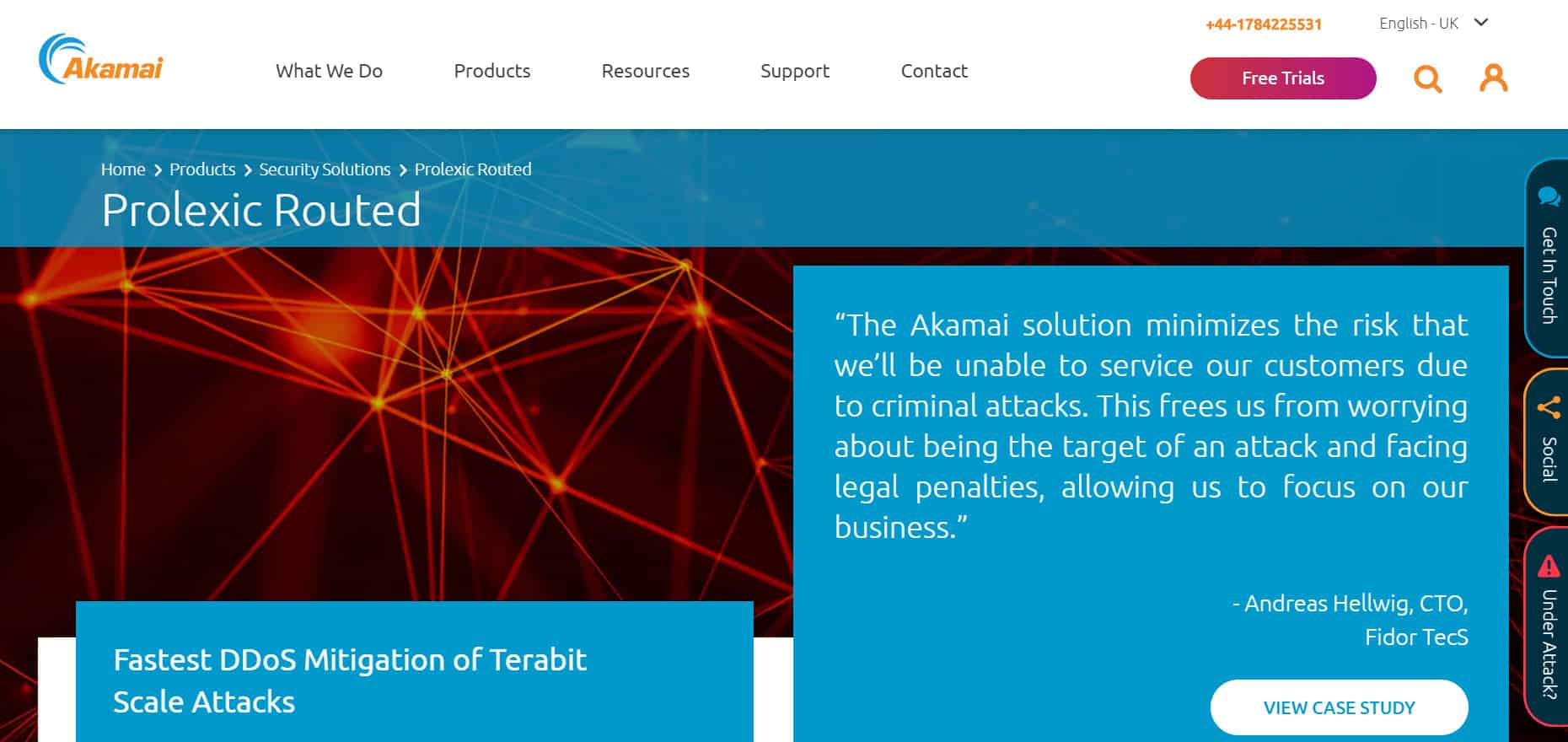
Akamai Prolexic Routed is a managed DDoS security service that can block DDoS attacks such as UDP floods, SYN floods, HTTP GET, and POST floods. Akamai Prolexic Routed has zero-second mitigation so that threats are spotted the moment they occur. However, if you require more support you have the assistance of the Security Operations Center to fall back on 24/7.
Key Features
- DDoS absorption: Protects sites and Web assets
- Attack analysis: Show attack events in the dashboard
- A cloud platform: Offers an on-premises version from Corero
Why do we recommend it?
Akamai Prolexic Routed is a cloud service that is provided by one of the leading cybersecurity firms in the world. The reputation of Akamai is itself enough to get this product on our list. However, Akamai doesn’t rest on its laurels and provides a very powerful DDoS protection service that rapidly scans all incoming traffic at a rate of 400 Gbps. The speed of the Akamai system and its global distribution in 16 centers around the world provide this service with its ability to compete with Cloudflare.
Network traffic monitoring is another feature that Akamai Prolexic Routed uses to catch attacks early on. You can view real-time traffic data through the dashboard. You can also fall back on the 8.0 Tbps of bandwidth supplied by Akamai’s global network with 19 distributed scrubbing centers distributed across the world.
Who is it recommended for?
The Akamai service is aimed at big businesses and doesn’t offer a free tier, which shows that the company realizes that Cloudflare is unbeatable in that sector. Akamai doesn’t publish a price list, which is another reason that small businesses probably won’t go for this service.
Pros:
- High capacity: Total platform capacity is more than 250 Tbps
- Router and firewall rules: Provides access control lists
- Dual stack: Operates with IPv4 and IPv6 addresses
Cons:
- No price list: You need to contact the Sales Department
Overall, if you’re in search of a high-performance managed DDoS protection service then Akamai Prolexic Routed is worth a look. If you want to view the pricing for Akamai Prolexic Routed then you will have to contact the sales team directly. You can start a free trial here.
Protect Yourself with a DDoS Protection Service
It only takes one attack to put your network offline and cost you thousands or tens of thousands of dollars worth of damage.
Whether you choose to use an in-house product like SolarWinds Security Event Manager or a managed DDoS protection service like Akamai Prolexic Routed, it is important to be aware of what online services you’re protecting.
For example, if you want to protect your website then a website application firewall like Sucuri Website Firewall is likely to be your best choice. Remember that not all DDoS attacks are the same, and attackers look to strike your defenses where you least expect it.
Further reading: Best WAFs Reviewed – Buyer’s Guide
DDoS Protection FAQs
Do VPNs protect you from DDoS attacks?
Yes. A VPN will protect you against DDoS attacks in two ways. First, it hides the real address of your device – all traffic goes to the VPN rather than directly to you. Secondly, the VPN has a great deal of connection capacity and so is able to absorb the volumes of traffic that would overwhelm your computer. Get a VPN service with a static IP address if you expect incoming connections.
How long can a DDoS attack last?
Commercial DDoS services offer attack durations for as little as 5 minutes. Hardcore hacker-team DDoS attacks can last 24 hours or even as long as 72 hours.
How long does it take to recover from a DDoS attack?
DDoS attacks don’t cause any physical damage, they just block legitimate users from getting access to your site or service. Technical recovery is immediate because as soon as the fake connection requests stop, legitimate requests will get through. Reputation damage can take a long time to recover from.
Can you reverse a DDoS?
In theory, you can DDoS back to an address that DDoSed you. However, there isn’t much point in doing that because the computer that attacked you is just infected by a bot. You won’t get to the real attacker. Also, a botnet that runs an attack can contain hundreds of thousands of computers so you would tie up your own resources for a long time in revenge attacks on all of them.

